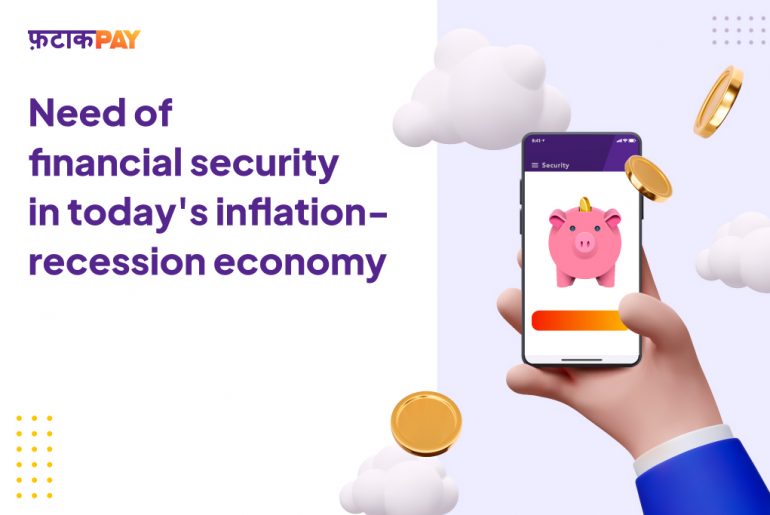Financial security is a key concern for many people in today’s economy. With inflation on the rise and the threat of recession looming, it’s more important than ever to make sure that your financial situation is stable and secure. There are several reasons why financial security is important in today’s economy
Inflation: Inflation is a persistent rise in the general price level of goods and services in an economy. When prices rise, the value of money falls, which means that you need more money to buy the same goods and services. This can erode your purchasing power over time and make it harder to afford the things you need.
Recession: A recession is a period of economic downturn, characterised by high unemployment, low consumer spending, and low business investment. A recession can be a stressful time for everyone, but it can be especially difficult for those who are unprepared. Having financial security can help you weather the storm and come out on the other side in a better position.
Many people complain about the effect of recession on their finances. However, there are ways in which you can tackle recession.
Ensure that you have savings
You cannot afford to ignore your savings. Ensure that you save more than half of what you earn. Spend less money. While it may seem challenging at first, consistent savings will go a long way in ensuring that you can continue with your investments and secure your financial future. Prioritise your expenses. If you’re there and have extra money at your disposal, you can feel free to invest it. In this way you can plan your savings. If not, be sure to build a solid emergency fund first.
Focus on having emergency funds
Bad times call for strict measures. That is where your emergency funds come into play. A large amount of your emergency fund can help tackle the insecurity and uncertainty brought in by recession.
Irrespective of how your earnings may have been affected due to the recession, you must have an emergency fund equivalent to 3 to 6 months of your monthly salary, with the latter end of that range being ideal. If you must dip into your emergency savings to take out some money, remember to replenish the same with your next salary.
Seek necessary insurance
A recession can have a very damaging effect. This calls for insurance as a much-wanted security coverage. Don’t compromise on paying health and life insurance premiums. Remember that investments alone do not make up for financial security. Insurance is an important aspect too that we should not ignore. The need for insurance is illustrated in the following points:
- Insurance plans will help you pay for medical emergencies, hospitalisation, contraction of any illnesses and treatment, and medical care required in the future.
- The financial loss to the family due to the unfortunate death of the sole earner can be covered by insurance plans. The family can also repay any debts like home loans or other debts which the person insured may have incurred in his/her lifetime.
- Insurance plans will help your family maintain their standard of living in case you are not around in the future. This will help them cover the costs of running the household through the insurance lump sum payout. The insurance money will give your family some much-needed breathing space along with coverage for all expenditure in case of death/accident/medical emergency of the policyholder.
Invest mindfully
You may wonder if investing is a good idea if we’re in a recession or are headed in that direction. Is it wiser to take every rupee you make and keep it in cash?
During a recession, stock values often decline. In theory, that’s bad news for an existing portfolio, yet leaving investments alone means not locking in recession-related losses by selling.
What’s more, lower stock values offer a solid opportunity to invest on the cheap (relatively speaking). Having enough savings is mandatory, when you are planning to invest in the stock market. However there are additional things that you must keep in mind, if you’re planning to invest in a recession:
- You’re not planning to touch your portfolio for at least seven years. Investing during a recession isn’t for the faint of heart. You may think you’re buying at a low, only to see your portfolio value decline a few days later. The best way to avoid losses in a recession — and come out ahead — is to take a long-term approach to investments. Plan on leaving your money alone for at least seven years.
- You’re not going to obsessively check your portfolio. When the economy is in bad shape and there’s lots of stock market movement, you may be more inclined to log on to your brokerage account every day and see how your portfolio is doing. But, if you’re going to invest during a recession, you simply can’t do that. The more you check up on your investments, the more likely you are to panic. And, when you panic, you risk making rash decisions, such as unloading poorly performing stocks, that force you to lock in losses.
It can be a great idea to invest during a recession but only if you’re in a strong enough financial position to do so and only if you have the right attitude and approach. You should never compromise your near-term financial security for long-term gain. Remember that if you’re hurting financially, there’s no shame in missing out on opportunities. Instead, focus on paying your bills and staying physically and mentally healthy. You can always ramp up your investments at a later point in life — once your job is more secure, your earnings are steady, and your mind is more at ease on the whole.
Real-world results of investing in recessions
Long-term investors who put money to work during a recession have done pretty well over time. Looking at data from three recent recessions before the COVID-19 pandemic — the Great Recession from 2007-2009, the recession in 2001 fueled by the dot-com crash and the 9/11 attacks, and the 1990-91 recession that followed a long economic expansion in the 1980s — you might be surprised at the long-term results, even if investors’ timing wasn’t perfect.
If you invest at the market’s lowest point during a recession, you’re likely going to do quite well over time. But one thing investors should realise is that trying to time the market is almost always a losing battle. There’s no crystal ball that can tell you when the market will reach the bottom. In other words, you are not going to invest at the perfect time
The above figure shows the cumulative returns of BSE Sensex. The financial data for the above figure was extracted from Yahoo Finance. The data was processed in Python. As shown in the figure, If 1 rupee was invested in Sensex on 1st January 2010, its value would be approximately Rs 3.4 on 9th January 2023. That means your investment would generate a return of 240 % !! Isn’t that awesome ?!
In a nutshell, a recession can be a great time to buy the stocks of top-notch businesses at favourable prices.
To conclude, there are several ways that you can work towards financial security. Building an emergency fund, saving for retirement, and having a budget are all important steps. It’s also important to be aware of the financial products and services that are available to you, such as insurance, investments, and financial planning services. By taking control of your financial situation, you can give yourself the security you need to manage any financial situation.







